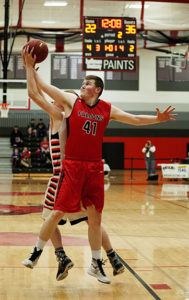Building tenacity in players and teams
As we approach tournament time, the most important time of the year, it’s time to put your money where your mouth is. This is by far my favorite time of the year. A time where teams literally separate themselves from the pack.
I want to share some thoughts on tough teams from the late Don Meyer, as well as some practical information from a performance perspective that gives your players the opportunity to perform at a high level.
Tough teams
Here are some thoughts from Meyer on playing with toughness and overcoming difficult situations.- Win on the road. Not since 1980 has a collegiate team won a championship by winning less than half of their road games. It’s those wins that build confidence and tenacity, giving your players the ability to thrive in a tough environment.
- Tough teams win in tough places. Never get blown out: Only one team in the past 25 years has suffered a loss by more than 25 points and gone on to win a championship.
- Tough teams always give themselves a chance to win.
- Set the tone. Tough teams determine how games are played. Tough teams execute and control the tempo.
- Always show toughness. When tough teams are down, they do not show frustration. If tough teams are hurt, they do not show pain. The opponent cannot read a tough team.
- Tough teams are consistent. Tough teams always show up to play every time they step on the floor. Practice is tougher than games, so games become easy.
- Respect every opponent. Tough teams understand that every game is important. Tough teams understand that every opponent, no matter its record or reputation, can win the game.
- Dominate the boards. No team with a negative rebounding margin has won a college basketball championship in the post John Wooden era.
- Tough teams play great defense, and they take pride in doing it.
- Tough teams take charges. Tough teams get on the floor. Tough teams do not commit turnovers. Tough teams believe in the little things.
To build tough teams, you have to have tough players. At this point in the season, my main objective is to make sure our guys are available to play. A player’s best ability is their availability. In our program, we talk about physically and mentally tough “every day guys.”
From a performance perspective, every player will have a different physiological buffer zone or functional reserve. Fergus Connolly, performance director for the University of Michigan football program, defines it as, “The remaining capacity of an organic or organ to fulfill its physiological activity; in this context stress and the energy needed to manage stress and the energy needed to manage stress and fatigue drain functional reserve.”
What does this mean for us? It means that we have to be keenly aware of how the body adjusts and adapts to stress, especially at this point in the season.
 First, let’s define performance as “fitness minus fatigue.” If you’re worried about fitness at this time of the year, you have bigger problems. In our program, we’re always looking for markers of fitness and fatigue, which for us come in the form of heart rate variability and quality/quantity of sleep. We also use a wellness questionnaire that includes a player’s assessment of mindset, sleep, nutrition, training and readiness, which make up our performance model. Ultimately, it’s our awareness of fitness, fatigue and how this impacts freshness.
First, let’s define performance as “fitness minus fatigue.” If you’re worried about fitness at this time of the year, you have bigger problems. In our program, we’re always looking for markers of fitness and fatigue, which for us come in the form of heart rate variability and quality/quantity of sleep. We also use a wellness questionnaire that includes a player’s assessment of mindset, sleep, nutrition, training and readiness, which make up our performance model. Ultimately, it’s our awareness of fitness, fatigue and how this impacts freshness.
I also want to introduce the concept of prescription-to-dose ratio. In essence, this is similar to a medical prescription — the wrong dose of the right medication can be lethal. We tend to keep our volume pretty low and our intensity high in the weight room at strategic times, and we use regeneration or “flush” training sessions to promote circulation, movement and recovery.
Tough players
Here are some thoughts on developing toughness in players that coaches can share with their teams.
- Tough players practice positive mental wellness habits, including specific breathing, visualization and self-talk. I highly recommend checking out the Lucid mental training app for student-athletes.
- Tough players prioritize sleep. We do not practice or train before 8 a.m. if at all possible during this time of the year. We encourage our players to be locked into a consistent bedtime and wake time that provides eight to 11 hours of sleep each night.
- Tough players fuel their bodies by taking ownership of what they eat. We offer as many healthy quick-hitter options as possible.
- Tough players drink water. We encourage players to drink at least half their body weight in ounces throughout the day. Dehydration causes fatigue.
- Tough players continue to train during the season, including lifting and skill development.
- Tough players own what’s in their control.
- Tough players make up tough teams.
The toughest coaches and players I’ve ever been around demonstrate an awareness and connection to what they’re doing. They own every bit of the process leaving nothing to chance. I don’t believe in luck, but I do believe in preparation and opportunity. Be ready when your opportunity comes.
Henry Barrera, CSCS, is the director of performance for men’s basketball at Liberty University in Lynchburg, Virginia. He can be reached at [email protected] or on Twitter at @hoopdiaries.









